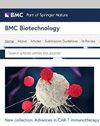Fabrication and characterization of metformin-loaded PLGA/Collagen nanofibers for modulation of macrophage polarization for tissue engineering and regenerative medicine
IF 3.5
3区 生物学
Q2 BIOTECHNOLOGY & APPLIED MICROBIOLOGY
引用次数: 0
Abstract
In tissue engineering (TE) and regenerative medicine, the accessibility of engineered scaffolds that modulate inflammatory states is extremely necessary. The aim of the current work was to assess the efficacy of metformin (MET) incorporated in PLGA/Collagen nanofibers (Met-PLGA/Col NFs) to modulate RAW264.7 macrophage phenotype from pro-inflammatory status (M1) to anti-inflammatory status (M2). Given this, MET-PLGA/Col NFs were fabricated using an electrospinning technique. Structural characterization such as morphology, chemical and mechanical properties, and drug discharge pattern were assessed. MTT assay test exposed that MET-PLGA/Col NFs remarkably had increased cell survival in comparison with pure PLGA/Collagen NFs and control (p < 0.05) 72 h after incubation. Based on the qPCR assay, a reduction in the expression of iNOS-2 and SOCS3 was found in the cells seeded on MET-PLGA/Col NFs, demonstrating the substantial modulation of the M1 phenotype to the M2 phenotype. Moreover, it was determined a main decrease in the pro-inflammatory cytokines and mediator’s expression but the growth factors amount related to anti-inflammatory M2 were meaningfully upregulated. Finally, MET-PLGA/Col NFs possibly will ensure a beneficial potential for effective variation of the macrophage response from an inflammatory phase (M1) to a pro-regenerative (M2) phase.用于组织工程和再生医学的二甲双胍负载聚乳酸/胶原蛋白纳米纤维的制备与表征
在组织工程(TE)和再生医学中,获得可调节炎症状态的工程支架极为必要。目前的研究旨在评估二甲双胍(MET)与 PLGA/胶原蛋白纳米纤维(MET-PLGA/Col NFs)结合后对 RAW264.7 巨噬细胞表型从促炎状态(M1)到抗炎状态(M2)的调节作用。有鉴于此,我们采用电纺丝技术制造了 MET-PLGA/Col NFs。对其结构特征进行了评估,如形态、化学和机械性能以及药物排放模式。MTT 试验表明,与纯 PLGA/Collagen NFs 和对照组相比,MET-PLGA/Col NFs 在培养 72 h 后显著提高了细胞存活率(p < 0.05)。根据 qPCR 分析,在 MET-PLGA/Col NFs 上播种的细胞中,iNOS-2 和 SOCS3 的表达量减少,这表明 M1 表型向 M2 表型发生了实质性改变。此外,还发现促炎细胞因子和介质的表达量大幅减少,但与抗炎 M2 有关的生长因子量却显著增加。最后,MET-PLGA/Col NFs 可能会确保巨噬细胞反应从炎症阶段(M1)有效转变为促进再生阶段(M2)的有益潜力。
本文章由计算机程序翻译,如有差异,请以英文原文为准。
求助全文
约1分钟内获得全文
求助全文
来源期刊

BMC Biotechnology
工程技术-生物工程与应用微生物
CiteScore
6.60
自引率
0.00%
发文量
34
审稿时长
2 months
期刊介绍:
BMC Biotechnology is an open access, peer-reviewed journal that considers articles on the manipulation of biological macromolecules or organisms for use in experimental procedures, cellular and tissue engineering or in the pharmaceutical, agricultural biotechnology and allied industries.
 求助内容:
求助内容: 应助结果提醒方式:
应助结果提醒方式:


